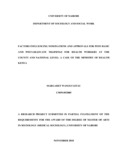| dc.description.abstract | Development and training are a continuous and systematic process. Training is not effective unless it has a purpose and that purpose can only be defined if the training needs of organisations and its employees are identified and analyzed (Staff development Manual, 2014). Training is seen as a participatory and collective responsibility of the national and county governments and other stakeholders. The study sought to determine the factors influencing nominations and approvals for post-basic and post graduate trainings for health workers at the county and national level, a case of the Ministry of Health Kenya. The study was guided by the following objectives: to determine the status of Training Need Assessments and training projections that are used by county training committee in nominating and selecting training applicants; to determine the criteria counties are using for identifying the training needs of the applicants they recommend for course approvals by the Ministry of Health at the national level; to outline the main post basic and post graduate specialized trainings being approved at Ministerial Human Resource Management Advisory Committee (MHRMAC) level; and to examine the extent to which the laid down course nomination and approval procedures are adhered to by the county and national governments. The study adopted a descriptive survey with a study population comprising of course applications from 78 Medical Officers 28 Clinical officers and 40 nurses. The study found that the training committees had few written down criteria, limited or no TNA or training projections that were available to guide nomination or approval decisions. The choice of courses was found to be more supply driven than demand driven. Officers would take the initiative of applying, getting admission and then seek course approval and study clearance. The study found that the justification of the applicants’ immediate supervisors and training committees influenced the course approval decisions. Release of officers was pegged on availability of a replacement for the officer to ensure no compromise in service delivery.The study concludes that the factors influencing course approvals for post basic and post graduate trainings for health workers are not standardized but vary across the counties. In addition, the main post basic and post graduate training areas for Medical officers, clinical officers and nurses were found to concur with the critical training areas as per the TNA report 2015. The study also found there was limited resource allocation for training and furthermore, these resources were not equitably divided among the cadres. The study recommends that the National and County Governments improve their consultation and collaboration to ensure that requests for course approvals fit into training projections based on actual TNA from the counties and emerging issues and diseases or conditions. MHRMAC to rationalize equitable distribution of the training money across the cadres | en_US |



